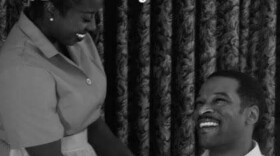Next week, FaceOffTheatre will present a play by an all children’s cast that deals with two very serious subjects - the Holocaust and the Underground Railroad. Home On The Mornin’ Train by Kim Hines puts you in the shoes of kids facing some of the most difficult periods in history.
You can see the play April 14th through 17th at the Epic Center Theatre in Kalamazoo.
Watching Home On The Mornin’ Train is like seeing a venn diagram come to life. On the right side of the stage, African American kids run away from the bounds of slavery. On the left side, Jewish children try to escape Nazi Germany.
There are many similarities in their stories and sometimes the characters physically meet in the middle. At one point, a Jewish boy and a slave girl face and mimic each other, as if looking at a mirror.
Both kids are afraid of getting caught and sad to leave behind the life they’ve always known - but they also have hope for freedom and music to get them through it. While the Jewish children recall the traditional songs their mothers used to sing to them, the songs from the Underground Railroad come with secret messages. Jalayna Jones is part of the chorus.
“Some of the messages like Wade in the Water is telling you to be quiet," says Jones.
Director Bianca Washington says many kids in the cast haven’t learned much about slavery or the Holocaust in school. But she says being in this play has helped kids, like 7-year-old Jackson Kastener - one of the youngest cast members - to understand these difficult parts of human history.
“I remember our first table read that we had and he started crying. And everyone around the table just did not know why. And he said ‘this makes me sad because I would miss my mom too.’ And this is a 7-year-old, completely connecting to the material.,” says Washington.
As for the older kids, 19-year-old Alex Hoyle says being part of this play makes him appreciate living in the 21st century.
“I can express myself freely and say what I want to say and be who I want to be , without the consequences like getting taken away, getting sent to a camp just because of the color of my skin, or the way I speak, or who I spend my time with,” he says.
Washington says the play is set in the past, but these secret struggles are still going on today. Take Flint, for example.
“There are some folks who are here in our country that are illegal and they’re not answering their doors to get water because they’re in fear of being taken away and deported back to where they’re from. So there’s an underground happening there as well. How do we get water to folks that need it?”
Alex Hoyle recalls a line from the play by the character Olivia - the daughter of a freed slave.
“It’s ‘nobody’s free until we’re all free.’ And I think that is like…that’s what the play is about,” he says.
You can stay in touch with WMUK news on Facebook, Twitter, and by signing up for our eNewsletter.




